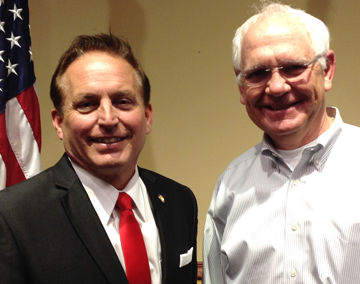SIOUX CITY | Woodbury County takes a place in Iowa electoral history Tuesday.
A special election for a state House seat will be the first test of the state's new voter ID law.
Democrat Rita DeJong and Republican Jacob Bossman, both of Sioux City, are competing in the district, which includes Sioux City's Morningside neighborhood and some areas in northern and western Woodbury County. The seat was recently vacated by Jim Carlin, who won a special election for a state Senate seat last month.
Woodbury County poll workers have been trained on the new photo-ID requirement and are ready for implementing it in Tuesday's election, said Pat Gill, the county's top election official. Polls will be open from 7 a.m. to 9 p.m.
"Most voters will see very little difference in the amount of time it takes to process them as they cast their vote," Gill said.
Gill said workers will expand the use of electronic poll books, where most county voters are already accustomed to scanning their driver’s license as a look-up tool to facilitate the process.
Gill noted there is some flexibility in the implementation of the voter ID for 2018.
"Since this year is the first year of the requirement, it is considered a soft rollout. If the voters do not have the required ID, they will simply be asked to sign an affidavit that informs them of the requirement and they acknowledge that they are the person they say they are, as they exercise their right to vote," Gill said.
House File 516 was passed by the Republican-controlled Legislature and signed into law by former Gov. Terry Branstad, despite concerns from Democrats and civil rights groups that the law’s true intent was a thinly-veiled attempt to suppress turnout by Democratic-leaning voters.
Besides requiring ID and signature verification at the polls, the law also ends straight-party voting and shortens the period for early voting from 40 to 29 days.
Iowa Secretary of State Paul Pate in December began mailing ID cards to about 123,000 registered voters who do not already have a valid Iowa driver’s license or state identification card.
The cards are free and will be sent automatically to roughly 6 percent of Iowa’s registered voters. Pate, who serves as the state's elections commissioner, said the process is designed to ensure all registered voters in Iowa have an identification card to use when voting in 2018.
“It should be easy to vote, but hard to cheat, and that’s what this new law ensures,” Pate said in a statement. “We are taking the unprecedented step of mailing free voter ID cards automatically to every registered voter who does not already have an Iowa driver’s license or non-driver’s ID. Only those Iowans will receive these cards. I encourage them to be on the lookout for the Voter ID cards in the mail, and when they receive their card, open it, sign it and keep it.”
Registered voters who have a valid driver’s license or a non-operator identification card from the Iowa Department of Transportation will not receive a free card. They will need to take their current state-issued ID with them to the polls, according to Pate’s office.
Gill said Pate's office has been good to work with in getting information for training poll workers. However, Gill spoke against the need for the new law, as he had for years when Republicans brought it up unsuccessfully.
"I have never witnessed any activity that I felt would warrant the implementation of a voter ID requirement. That being said, my office will comply and fulfill the requirements of the law in a fair and competent manner that most voters will find unobjectionable," Gill said.


